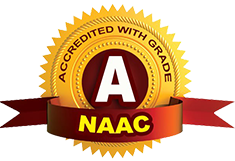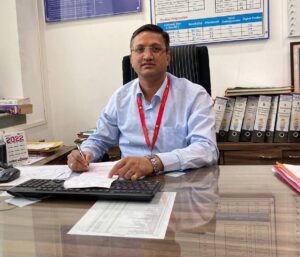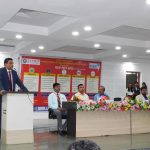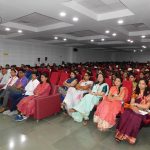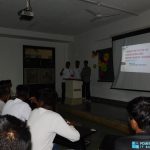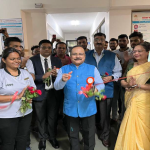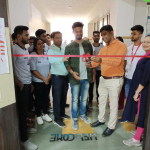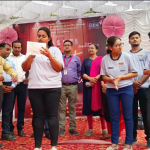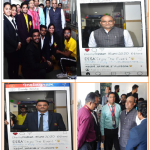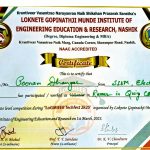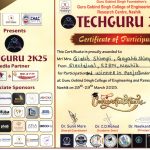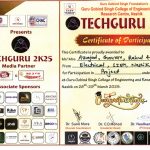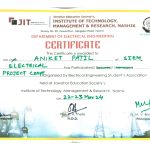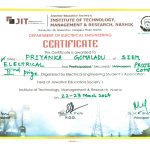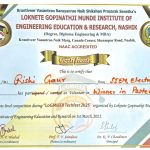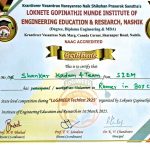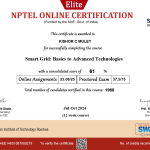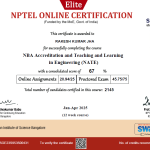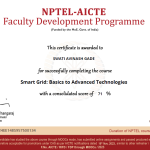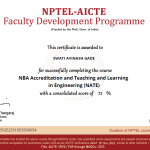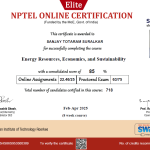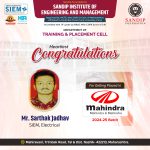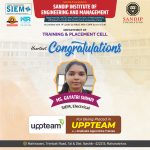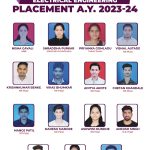| Year |
Subject and COs |
| SE Sem I |
Course : Power Generation Technologies Course Code: 203141 |
| Co. No. |
Course Outcomes |
| CO1 |
Identify components and elaborate working principle of conventional power plants. |
| CO2 |
Recognize the importance and opportunities of renewable energies. |
| CO3 |
Calculate and control power output of wind solar, and hydro power plant. |
| CO4 |
Describe process of grid interconnection of distributed generation and requirement |
| CO5 |
Interpret the environmental and social impact of various generation technologies. |
| Course : Engineering Mathematics-III Course Code: 207006 |
| Co. No. |
Course Outcomes |
| CO1 |
Solve higher order linear differential equation using appropriate techniques to model and analyze electrical circuits. |
| CO2 |
Apply Integral transforms such as Laplace transform, Fourier transform and Z-Transform to solve problems related to signal processing and control systems. |
| CO3 |
Apply Statistical methods like correlation, regression and Probability theory as applicable to analyze and interpret experimental data related to energy management, power systems, testing and quality control. |
| CO4 |
Perform Vector differentiation and integration, analyze the vector fields and apply to wave theory and electro-magnetic fields. |
| CO5 |
Analyze Complex functions, conformal mappings, and perform contour integration in the study of electrostatics, signal and image processing. |
| Course : Material Science Course Code: 203142 |
| Co. No. |
Course Outcomes |
| CO1 |
Discuss classification,properties and characteristics of different electrical engineering materials. |
| CO2 |
State various applicationsmeasuring methods for parameters of different classes of electrical engineering materials. |
| CO3 |
Solve simple problems based on dielectric, magnetic and conducting materials |
| CO4 |
Apply knowledge of Nano-technology to electrical engineering. |
| CO5 |
Execute tests ondielectric, insulating, magnetic, conducting, resistive materials as per IS to decide the quality of thematerials. |
| CO6 |
Create learning resource material ethically to demonstrate self learning leading to lifelong learning skills and usage of ICT/ online technology through collaborative/active learning activities. |
| Course : Analog And Digital Electronics Course Code: 203143 |
| Co. No. |
Course Outcomes |
| CO1 |
Design logical, sequential and combinational digital circuit using K-Map. |
| CO2 |
Demonstrate different digital memories and programmable logic families. |
| CO3 |
Apply and analyze applications of OPAMP in open and closed loop condition. |
| CO4 |
Design uncontrolled rectifier with given specifications. |
| Course : Electrical Measurements and Instrumentation Course Code: 203144 |
| Co. No. |
Course Outcomes |
| CO1 |
Define various characteristic and classify measuring instruments along with range extension techniques. |
| CO2 |
Apply measurement techniques for measurement of resistance, inductance and capacitance. |
| CO3 |
Demonstrate construction, working principle of electrodynamo type and induction type instruments for measurement of power and energy. |
| CO4 |
Make use of CRO for measurement of voltage, current and frequency. |
| CO5 |
Classify transducer and apply it for measurement of physical parameters in real time. |
| Course : Soft Skills Course Code:203151 |
| Co. No. |
Course Outcomes |
| CO1 |
DoSWOC analysis. |
| CO2 |
Develop presentation and take part in group discussion. |
| CO3 |
Understand and implement etiquette in workplace and in society at large. |
| CO4 |
Work in team with team spirit. |
| CO5 |
Utilize the techniques for time management and stress management. |
| Course : Applications of Mathematics in Electrical Engineering Course Code:203150 |
| Co. No. |
Course Outcomes |
| CO1 |
Apply fundamentals of mathematics in solving electrical engineering problem |
| CO2 |
Analyze complex electrical engineering problem using mathematical techniques. |
| CO3 |
Implement program and simulation for problems in electrical engineering. |
| CO4 |
Demonstrate self lifelong learning skills with applications of mathematics in electrical engineering through software. |
| Course :Solar Thermal System Course Code: 203152 (A) |
| Co. No. |
Course Outcomes |
| CO1 |
Differentiate between types of solar Concentrators |
| CO2 |
Apply software tool for solar concentrators |
| CO3 |
Design different types of Solar collectors and balance of plant |
| Course :C Language Programming Course Code: 203152 (B) |
| Co. No. |
Course Outcomes |
| CO1 |
Elaborate data types, arithmetic, logical and conditional operators |
| CO2 |
Apply control and looping statements in C programming |
| CO3 |
Write programming using C language with functions, arrays and pointers. |
| SE Sem II |
Course : Power System I Course Code: 203145 |
| Co. No. |
Course Outcomes |
| CO1 |
Recognize different patterns of load curve and calculate associated different factors with it and tariff. |
| CO2 |
Draft specifications of electrical equipment in power station. |
| CO3 |
Design electrical and mechanical aspects in overhead transmission and underground cables. |
| CO4 |
Evaluate the inductance and capacitance of different transmission line configurations. |
| CO5 |
Analyse the performance of short and medium transmission lines |
| Course : Electrical Machines I Course Code:203146 |
| Co. No. |
Course Outcomes |
| CO1 |
Evaluate performance parameters of transformer with experimentation and demonstrate construction along with specifications as per standards. |
| CO2 |
Distinguish between various types of transformer connections as per vector groups with application and to perform parallel operation of single/three phase transformers. |
| CO3 |
Select and draft specifications of DC machines and Induction motors for various applications along with speed control methods. |
| CO4 |
Justify the need of starters in electrical machines with merits and demerits. |
| CO5 |
Test and evaluate performance of DC machines and Induction motors as per IS standard. |
| Course : Network Analysis Course Code:203147 |
| Co. No. |
Course Outcomes |
| CO1 |
Calculate current/voltage in electrical circuits using simplification techniques, Mesh, Nodal analysis and network theorems. |
| CO2 |
Analyze the response of RLC circuit with electrical supply in transient and stead state. |
| CO3 |
Apply Laplace transform to analyze behaviour of an electrical circuit. |
| CO4 |
Derive formula and solve numerical of two port network and Design of filters |
| CO5 |
Applyknowledge of network theory to find transfer function, poles and zeroes location to perform stability analysis and parallel resonance |
| Course : Numerical Methods and Computer Programming Course Code: 203148 |
| Co. No. |
Course Outcomes |
| CO1 |
Demonstrate types of errors in computation and their causes of occurrence. |
| CO2 |
Calculate root of algebraic and transcendental equations using various methods. |
| CO3 |
Apply numerical methods for various mathematical problems such as interpolation, numerical differentiation, integration and ordinary differential equation. |
| CO4 |
Solve linear simultaneous equation using direct and indirect method. |
| CO5 |
Develop algorithms and write computer programs for various numerical methods. |
| Course : Fundamentals of Microcontroller and Applications Course Code: 203149 |
| Co. No. |
Course Outcomes |
| CO1 |
Describe the architecture and features of various types of the microcontroller. |
| CO2 |
Illustrate addressing modes and execute programs in assembly language for the microcontroller. |
| CO3 |
Write programs in C language for microcontroller 8051. |
| CO4 |
Elaborate interrupt structure of 8051 and program to handle interrupt and ADC809 |
| CO5 |
Define the protocol for serial communication and understand the microcontroller development systems. |
| CO6 |
Interface input output devices and measure electrical parameters with 8051 in real time. |
| Course : Solar Photovoltaic Systems Course Code: 203153(A) |
| Co. No. |
Course Outcomes |
| CO1 |
Design of Solar PV system for small and large installations |
| CO2 |
Handle software tools for Solar PV systems |
| Course : Installation & Maintenance of Electrical appliances Course Code: 203153(B) |
| Co. No. |
Course Outcomes |
| CO1 |
Observing the safety precautions while working |
| CO2 |
Test line cord for continuity with test lamp/ multimeter |
| CO3 |
Dismantle and reassemble an electric iron |
| CO4 |
Heater, kettle, room heater, toaster, hair dryer, mixer grinder,fan, lamp etc |
| Course : Project Based Learning Course Code: 203152 |
| Co. No. |
Course Outcomes |
| CO1 |
Identify, formulate, and analyze the simple project problem. |
| CO2 |
Apply knowledge of mathematics, basic sciences, and electrical engineering fundamentals to develop solutions for the project. |
| CO3 |
Learn to work in teams, and to plan and carry out different tasks that are required during a project. |
| CO4 |
Understand their own and their team-mate’s strengths and skills. |
| CO5 |
Draw information from a variety of sources and be able to filter and summarize the relevant points. |
| CO6 |
Communicate to different audiences in oral, visual, and written forms. |
| TE Sem I |
Course : Industrial And Technology Management Course Code: 303141 |
| Co. No. |
Course Outcomes |
| CO1 |
Differentiate between different types of business organizations and discuss the fundamentals of economics and management. |
| CO2 |
Explain the importance of technology management and quality management. |
| CO3 |
Explain the importance of IPR and role of Human Resource Management. |
| CO4 |
Understand the importance of Quality and its significance. |
| CO5 |
Describe the characteristics of marketing & its types and overview of financial Management. |
| CO6 |
Discuss the qualities of a good leader and road map to Entrepreneurship. |
| Course :Advanced Microcontroller and Embedded System Course Code:303145(A) |
| Co. No. |
Course Outcomes |
| CO1 |
Explain architecture of PIC 18F458 microcontroller, its instructions and the addressing
modes |
| CO2 |
Use Ports and timers for peripheral interfacing and delay generation. |
| CO3 |
Interface special and generate events using CCP module |
| CO4 |
Effectively use interrupt structure in internal and External interrupt mode. |
| CO5 |
Effectively use ADC for parameter measurement and also understand LCD interfacing. |
| CO6 |
Use Serial Communication and various serial communication protocols |
| Course :Digital Signal Processing Course Code:303145(B) |
| Co. No. |
Course Outcomes |
| CO1 |
Analyse discrete time signals and systems. |
| CO2 |
Construct frequency response of LTI system using Fourier Transform. |
| CO3 |
Design and realize IIR and FIR filters. |
| CO4 |
Apply concepts of DSP in applications of electrical engineering. |
| Course : Electrical Machines II Course Code: 303143 |
| Co. No. |
Course Outcomes |
| CO1 |
Learn construction, working principle of three phase Synchronous Machines, Induction Motors, A.C. Series Motor and Special Purpose Motors. |
| CO2 |
Understand characteristics of three phase Synchronous Machines, Induction Motors, A.C. Series Motor and Special Purpose Motors. |
| CO3 |
Select the above machines in Power System, industrial, household & Military Engineering applications. |
| CO4 |
Testing of machines to evaluate the performance through experimentation. |
| Course : Power Electronics Course Code: 303142 |
| Co. No. |
Course Outcomes |
| CO1 |
Develop characteristics of different power electronic switching devices. |
| CO2 |
Reproduce working principle of power electronic converters for different types of loads. |
| CO3 |
Choose the appropriate converter for different applications. |
| Course : Electrical Installation, Design and Condition Based Maintenance Course Code:303144 |
| Co. No. |
Course Outcomes |
| CO1 |
Classify different types of distribution supply system and determine economics of distribution system. compare and classify various substations, bus-bars and Earthing systems. |
| CO2 |
Demonstrate the importance and necessity of maintenance. |
| CO3 |
Analyse and test different condition monitoring methods. |
| CO4 |
Carry out estimation and costing of internal wiring for residential and commercial installations. |
| CO5 |
Apply electrical safety procedures. |
| Course : Seminar Course Code:303146 |
| Co. No. |
Course Outcomes |
| CO1 |
Relate with the current technologies and innovations in Electrical engineering. |
| CO2 |
Improve presentation and documentation skill. |
| CO3 |
Apply theoretical knowledge to actual industrial applications and research activity |
| CO4 |
Communicate effectively |
| Course : Energy Storage System Course Code:303147(A) |
| Co. No. |
Course Outcomes |
| CO1 |
Explain and differentiate various types of energy storage for suitable applications |
| CO2 |
Understand battery recycling techniques |
| Course : Start-up and Disruptive Innovations Course Code:303147(B) |
| Co. No. |
Course Outcomes |
| CO1 |
Describe role of incubation for Startup and recent national policy. |
| CO2 |
Identify various types of Startups |
| CO3 |
Explain impacts of disruptive innovation and Differentiate between disruptive innovation and
disruptive technology |
| TE Sem II |
Course : Power System II Course Code:303148 |
| Co. No. |
Course Outcomes |
| CO1 |
Solve problems involving modelling, design and performance evaluation of HVDC and EHVAC power transmission lines. |
| CO2 |
Calculate per unit values and develop Y bus for solution power flow equations in power transmission networks |
| CO3 |
Calculate currents and voltages in a faulted power system under both symmetrical and asymmetrical faults, and relate fault currents to circuit breaker ratings. |
| Course : Control System Engineering Course Code: 303150 |
| Co. No. |
Course Outcomes |
| CO1 |
Construct mathematical model of Electrical and Mechanical system using differential equations and transfer function and develop analogy between Electrical and Mechanical systems. |
| CO2 |
Determine time response of systems for a given input and perform analysis of first and second order systems using time domain specifications. |
| CO3 |
Investigate closed loop stability of system in s-plane using Routh Hurwitz stability criteria and root locus. |
| CO4 |
Analyze the systems in frequency domain and investigate stability using Nyquist plot and Bode plot |
| CO5 |
Design PID controller for a given plant to meet desired time domain specifications. |
| Course : Computer Aided Design of Electrical Machines Course Code: 303149 |
| Co. No. |
Course Outcomes |
| CO1 |
Summarize temperature rise, methods of cooling of transformer and consider IS 2026 in transformer design. |
| CO2 |
Design the overall dimensions of the transformer. |
| CO3 |
Analyze the performance parameters of transformer. |
| CO4 |
Design overall dimensions of three phase Induction motor |
| CO5 |
Analyze the performance parameters of three phase Induction motor. |
| CO6 |
Implement and develop computer aided design of transformer and induction motor. |
| Course : IoT and Its Applications in Electrical Engineering Course Code: 303151A |
| Co. No. |
Course Outcomes |
| CO1 |
Describe BEE Energy policies, Energy ACT. |
| CO2 |
List and apply demand side management measures for managing utility systems. |
| CO3 |
Explore and use simple data analytic tools. |
| CO4 |
Use various energy measurement and audit instruments. |
| Course : Energy Management Course Code: 303151D |
| Co. No. |
Course Outcomes |
| CO1 |
Describe BEE Energy policies, Energy ACT. |
| CO2 |
List and apply demand side management measures for managing utility systems. |
| CO3 |
Explore and use simple data analytic tools. |
| CO4 |
Use various energy measurement and audit instruments. |
| CO5 |
Evaluate economic feasibility of energy conservation projects. |
| CO6 |
Identify appropriate energy conservations methods for electric and thermal utilities. |
| Course : Internship Course Code: 303152 |
| Co. No. |
Course Outcomes |
| CO1 |
Understand the working culture and environment of the Industry and get familiar with various departments and practices in the industry. |
| CO2 |
Operate various meters, measuring instruments, tools used in industry efficiently and develop technical competence. |
| CO3 |
Apply internship learning in other course completions and final year project management, i.e. topic finalization, project planning, hardware development, result interpretations, report writing, etc. |
| CO4 |
Create a professional network and learn about ethical, safety measures, and legal practices. |
| CO5 |
Appreciate the responsibility of a professional towards society and the environment. |
| CO6 |
Identify career goals and personal aspirations. |
| Course : Ethical Practices for Engineers Course Code: 303153A |
| Co. No. |
Course Outcomes |
| CO1 |
Understand for their professional responsibilities as Engineers. |
| CO2 |
Recognize and think through ethically significant problem situations that are common in Engineering. |
| CO3 |
Evaluate the existing ethical standards for Engineering Practice. |
| Course : Project Management Course Code: 303153B |
| Co. No. |
Course Outcomes |
| CO1 |
Understand for their professional responsibilities as Engineers. |
| CO2 |
Recognize and think through ethically significant problem situations that are common in Engineering. |
| CO3 |
Evaluate the existing ethical standards for Engineering Practice. |
| BE Sem I |
Course : Power System Operation and Control Course Code: 403141 |
| Co. No. |
Course Outcomes |
| CO1 |
Summarize angle, voltage and frequency stability in the power system control . |
| CO2 |
Illustrate various ways of interchange of power between interconnected utilities . |
| CO3 |
Analyze stability and optimal load dispatch using different techniques. |
| CO4 |
Select appropriate FACTS devices for stable operation of the system . |
| CO5 |
Evaluate the stability of the system and suggest the methods to improve it . |
| Course :Advanced Control SystemCourse Code: 403142 |
| Co. No. |
Course Outcomes |
| CO1 |
Explain compensation networks, common nonlinearities, the concept of state, sampling and reconstruction, and concepts of advanced controls (Understanding) |
| CO2 |
Determine transfer function from state model (Applying) |
| CO3 |
Test controllability and observability properties of the system (Evaluating) |
| CO4 |
Design compensators, state feedback controls, and observers for the system (Creating) |
| Course : PLC and SCADA Course Code: 403143A |
| Co. No. |
Course Outcomes |
| CO1 |
Develop and explain the working of a PLC with the help of a block diagram. |
| CO2 |
Classify input and output interfacing devices with PLC. |
| CO3 |
Design PLC based application by proper selection criteria, developing GUI and ladder program. |
| CO4 |
Execute, debug, and test the programs developed for digital and analog operations. |
| CO5 |
Develop the architecture of SCADA and explain the importance of SCADA in critical infrastructure. |
| CO6 |
Describe the SCADA protocols and digital control systems, along with their architecture for automation. |
| Course : Power Quality Management Course Code: 403143B |
| Co. No. |
Course Outcomes |
| CO1 |
Understand power quality and attribute of power quality |
| CO2 |
Describe voltage flicker and mitigation of it |
| CO3 |
Analyze the effect of power system events on voltage sag and its characteristics. |
| CO4 |
Identify the sources of harmonics and harmonics produced |
| CO5 |
Select proper method for harmonic mitigation along with methods of power quality monitoring. |
| CO6 |
Carry out power quality monitoring using power quality analyzers. |
| Course : High Voltage Engineering Course Code: 403143C |
| Co. No. |
Course Outcomes |
| CO1 |
Identify, describe and analyze the breakdown theories of gaseous, solid and liquid materials. |
| CO2 |
Analyze the occurrence of over voltage and to provide remedial solutions |
| CO3 |
Describe and use of various methods of generation of high AC, DC, impulse voltage and current. |
| CO4 |
Demonstrate the methods of measurement of high AC, DC, impulse voltage and current, tests on high voltage equipment and devices |
| CO5 |
Study design of high voltage laboratory with all safety measures. |
| Course : Robotics and Automation Course Code:403143D |
| Co. No. |
Course Outcomes |
| CO1 |
Differentiate between types of robots based on configuration, method of control, types of drives, sensors used, etc. |
| CO2 |
Apply mathematical modeling of a robot for a specific application with given specifications. |
| CO3 |
Analyze the robot arm dynamics for calculation of torques and forces required for different joints of robots for control of the robot arm. |
| CO4 |
Apply knowledge of Robot for their various applications |
| Course : Alternate Energy System Course Code: 403144A |
| Co. No. |
Course Outcomes |
| CO1 |
Analyze the performance of solar thermal and photovoltaic systems. |
| CO2 |
Determine wind turbine performance. |
| CO3 |
Explain and evaluate biomass resources in an Indian context. |
| CO4 |
Illustrate the importance of storage systems. |
| CO5 |
Analyze the economics of renewable energy sources. |
| Course : Electric and Hybrid Vehicle Course Code: 403144B |
| Co. No. |
Course Outcomes |
| CO1 |
Analyze the Life Cycle Assessment of Li-ion battery. |
| CO2 |
Describe the different types of Li-ion charging methods |
| CO3 |
Comprehend the knowledge of drivetrain hybridization. |
| CO4 |
Evaluate EV motor sizing. |
| CO5 |
Classify Battery Recycling methods. |
| Course : Special-Purpose Machines Course Code:403144C |
| Co. No. |
Course Outcomes |
| CO1 |
Reproduce principal of operation of PMSM, Stepper motor, SRM, Switch reluctance and linear motors. |
| CO2 |
Develop torque – speed and performance characteristics of above motors. |
| CO3 |
Enlist application of above motors. |
| CO4 |
Demonstrate various control strategies. |
| Course : HVDC and FACTsCourse Code: 403144D |
| Co. No. |
Course Outcomes |
| CO1 |
Choose a proper FACTS controller for the specific application based on system requirements. CO2: CO3: CO4: |
| CO2 |
Analyze shunt, series, and combined controllers to explore different benefits. |
| CO3 |
Compare EHVAC and HVDC systems and to describe various types of DC links. |
| CO4 |
Describe various methods for the control of HVDC systems and to perform power flow analysis in AC/DC systems. |
| Course : MOOCs Course Code: 403146 |
| Co. No. |
Course Outcomes |
| CO1 |
Enables the students to directly engage and learn from the best faculty in the country in order to strengthen the fundamentals. |
| CO2 |
Explore new areas of interest in a relevant field. |
| CO3 |
Enable self learning initiative in learners. |
| CO4 |
Develop critical thinking to solve complex problems in engineering, science and humanities. |
| CO5 |
Improve communication skills by interacting with peers and course teachers. |
| Course :German Language-I Course Code: 403147(A) |
| Co. No. |
Course Outcomes |
| CO1 |
Will have the ability of basic communication. |
| CO2 |
Will have the knowledge of German script. |
| CO3 |
Will get introduced to reading ,writing and listening skills |
| CO4 |
Will develop interest to pursue profession in Indo-German Industry. |
| Course :Engineering Economics-I Course Code: 403147(B) |
| Co. No. |
Course Outcomes |
| CO1 |
Discuss concepts related to business and its impact on enterprise. |
| CO2 |
Illustrate time value of money in economic analysis. |
| Course : Project Stage I Course Code: 403145 |
| Co. No. |
Course Outcomes |
| CO1 |
Define the project problem statement and identify the scope of the project. |
| CO2 |
Search the appropriate research papers, standards and e-resources and write a literature survey. |
| CO3 |
Identify tools, techniques, methods, concepts, measuring devices, and instruments required for the project to define the methodology of the project. |
| CO4 |
Justify the selection of electrical, electronic and mechanical components for the project prototyping |
| CO5 |
Simulate or develop a system for software or hardware verification. |
| CO6 |
Write a project report with proper interpretation of results. |
| BE Sem II |
Course : Switchgear and Protection Course Code: 403148 |
| Co. No. |
Course Outcomes |
| CO1 |
Understand the fundamentals of protective relaying. |
| CO2 |
Demonstrate the arc interruption and analyze the RRRV in circuit breakers |
| CO3 |
Demonstrate the construction and working principle of air brake circuit breakers, SF6 circuit breakers, and a vacuum circuit breaker. |
| CO4 |
Explain the characteristics of static and digital relays and their applications in power systems. |
| CO5 |
Apply the differential protection scheme to large transformers, alternators, and induction motors. |
| CO6 |
Apply distance protection, three stepped protection for transmission line. |
| Course : Advanced Electrical Drives and Control Course Code: 403149 |
| Co. No. |
Course Outcomes |
| CO1 |
Explain motor load dynamics and multi quadrant operation of drives. |
| CO2 |
Analyze operation of converter fed and chopper fed DC drives. |
| CO3 |
Apply different braking methods of D.C. and induction motor drive. |
| CO4 |
Elaborate vector control for induction motor and BLDC drives. |
| CO5 |
Elaborate synchronous motor, reluctance motor drive. |
| CO6 |
Differentiate between classes and duty cycles of motors and select suitable drives in various industrial applications. |
| Course : Digital Control System Course Code: 403150A |
| Co. No. |
Course Outcomes |
| CO1 |
Analyze digital control system and its stability. |
| CO2 |
Differentiate between various control systems |
| CO3 |
Present system in state space format. |
| CO4 |
Design observer for system. |
| CO5 |
Understand digital controllers |
| CO6 |
Elaborate applications such as digital temperature control and position control |
| Course : Restructuring and Deregulation Course Code: 403150B |
| Co. No. |
Course Outcomes |
| CO1 |
Identify the various institutions in the Indian power sector and explain their role in the Indian power sector. |
| CO2 |
Explain the various fundamentals of power sector economics |
| CO3 |
Describe the regulatory process in India and list the steps involved in tariff determination and explain the phases of tariff determination |
| CO4 |
Describe and explain different power sector restructuring models and explain the concept of energy trading |
| CO5 |
Explain the types of electricity markets and compare the types of electricity markets . |
| CO6 |
State different transmission pricing methods and describe and compare various congestion management methods. |
| Course : Smart Grid Course Code: 403150C |
| Co. No. |
Course Outcomes |
| CO1 |
Apply the knowledge to differentiate between Conventional and Smart Grid |
| CO2 |
Describe importance of Supercapacitors. |
| CO3 |
Identify the need of Smart metering. |
| CO4 |
Apply the communication technology in smart grid. |
| CO5 |
Comprehend the issues of micro grid. |
| Course : Sensor Technology (Open Elective) Course Code: 403150D |
| Co. No. |
Course Outcomes |
| CO1 |
Understand the characteristics of sensors used for system monitoring and protection. |
| CO2 |
Interface the various position sensors to microcontrollers. |
| CO3 |
Demonstrate the characteristics of sensors used for light and image sensing. |
| Course : EHV AC Transmission Course Code: 403151A |
| Co. No. |
Course Outcomes |
| CO1 |
Highlight need for EHV ac transmission. |
| CO2 |
Calculate line and ground parameters. |
| CO3 |
Enlist problems encountered in EHV transmission. |
| CO4 |
Describe the effect of electric and magnetic fields on human beings. |
| Course :Illumination Engineering Course Code: 403151B |
| Co. No. |
Course Outcomes |
| CO1 |
Define and reproduce various terms in illumination. |
| CO2 |
Identify various parameters for illumination system design |
| CO3 |
Design indoor and outdoor lighting systems. |
| CO4 |
Enlist state of the art illumination systems. |
| Course : Electromagnetic Fields Course Code: 403151C |
| Co. No. |
Course Outcomes |
| CO1 |
Describe time varying Maxwell’s equations and their applications in electromagnetic problems |
| CO2 |
Interpret electric and magnetic field with the help of associated laws |
| CO3 |
Solve simple electrostatic and magnetic boundary conditions |
| CO4 |
Determine the relationship between time varying electric and magnetic fields and electromotive force |
| CO5 |
Solve electromagnetic problems with the help of mathematical tools. |
| Course : Artificial Intelligence and Machine Learning Course Code: 403151D |
| Co. No. |
Course Outcomes |
| CO1 |
Evaluate Artificial Intelligence (AI) and Machine Learning(ML) methods and describe their foundations. |
| CO2 |
Demonstrate knowledge of reasoning and knowledge representation for solving real world problems. |
| CO3 |
Illustrate the construction of learning and expert system Discuss current scope and limitations of AI and societal implications |
| CO4 |
Distinguish between different types of learning types. |
| CO5 |
Apply the different supervised, unsupervised and reinforcement learning methods. |
| Course : German Language-II Course Code: 403153A |
| Co. No. |
Course Outcomes |
| CO1 |
Will have the ability of advanced communication |
| CO2 |
Will develop reading, writing and listening skills |
| CO3 |
Will understand tenses in German Language. |
| CO4 |
Will develop interest to pursue a German language course. |
| Course : Engineering Economics-II Course Code: 403153B |
| Co. No. |
Course Outcomes |
| CO1 |
Apply various techniques for evaluation of engineering projects. |
| CO2 |
Assess cash flow under risk with varying parameters. |
| Course : Project Stage II Course Code: 403152 |
| Co. No. |
Course Outcomes |
| CO1 |
Identify tools, techniques, methods, concepts, measuring devices, and instruments required for the project to define the methodology of the project |
| CO2 |
Justify the selection of electrical, electronic and mechanical components for the project prototyping |
| CO3 |
Select the appropriate testing method for system performance evaluation |
| CO4 |
Interpret results obtained by simulation, and hardware implementation and decide on further action or write a conclusion |
| CO5 |
Write a project report and research paper on the project work |

